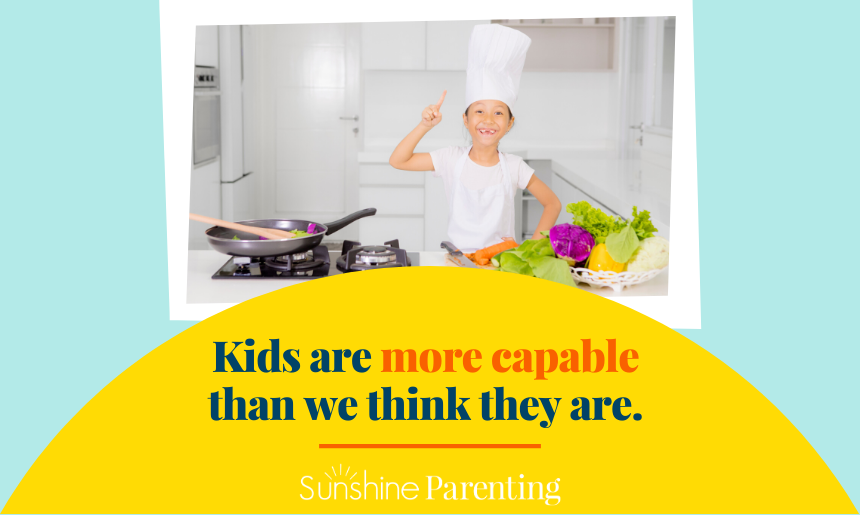 Managing your own belongings is one of many skills a responsible human adult needs. Even small humans can learn to be responsible for their own belongings. In order to allow kids to learn new skills, adults need to remember to give them small responsibilities and lots of guidance starting at an early age. We also need to understand that they will not initially do the tasks as well as we (fully grown adults) do. Being patient in giving instructions and allowing kids time to practice skills until they become competent at doing them on their own is what kids need from parents and other adults in order to grow into capable, responsible, thriving adults.
Managing your own belongings is one of many skills a responsible human adult needs. Even small humans can learn to be responsible for their own belongings. In order to allow kids to learn new skills, adults need to remember to give them small responsibilities and lots of guidance starting at an early age. We also need to understand that they will not initially do the tasks as well as we (fully grown adults) do. Being patient in giving instructions and allowing kids time to practice skills until they become competent at doing them on their own is what kids need from parents and other adults in order to grow into capable, responsible, thriving adults.
-Audrey Monke, Happy Campers: 9 Summer Camp Secrets for Raising Kids Who Become Thriving Adults
Insights from the produce aisle
It was several years ago when I – per my usual practice – assigned my sons to “divide and conquer” at the grocery store. I sent one to the produce section to get romaine lettuce – our usual dinner salad base. He returned several minutes later with a pre-washed bag of chopped romaine lettuce.
“That’s not the kind we get,” I told him.
“Well, it said ‘romaine’,” he responded.
And it was then that I had one of many parenting epiphanies I’ve had over the years (hopefully similar to other parents with more than one kid) about a skill I had neglected to teach one of my kids.
While his two older sisters had been shopping and cooking dinner for a few years by the time they were his age, he didn’t know what kind of lettuce we purchase or how we wash and prepare it.
So, of course, that was the day he discovered what a head of romaine lettuce looks like, how to chop it, wash and spin it in our salad spinner, and place the crisp, clean lettuce in our salad bowl. Following that day, he became our very competent salad prep cook.
I’ve had the privilege of working with thousands of other people’s children over the past three decades. And it always amazes me what kids are capable of. Kids are, on the whole, a lot more capable than we parents often give them credit for. That’s why I dedicated an entire chapter in my book, Happy Campers, to the topic of kids’ competence. The chapter is called Secret #6: Kids are More Capable Than Parents Think They Are.
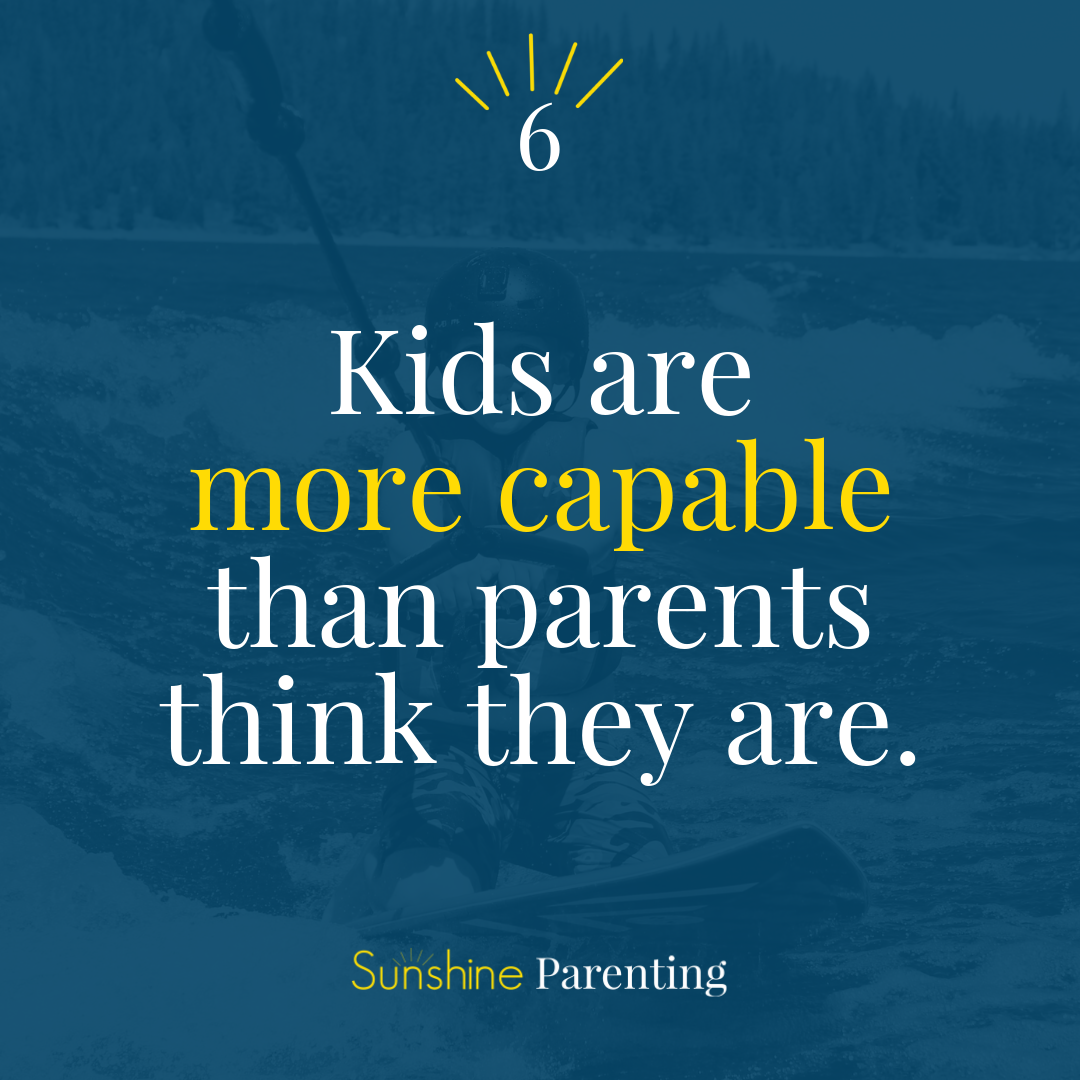
Four reasons we underestimate kids’ competence
#1: They’re always “babies” to us.
We see our kids every day, and their physical, social, and emotional growth unfold slowly. It’s natural to forget to periodically reassess where they are developmentally and what they are capable of.
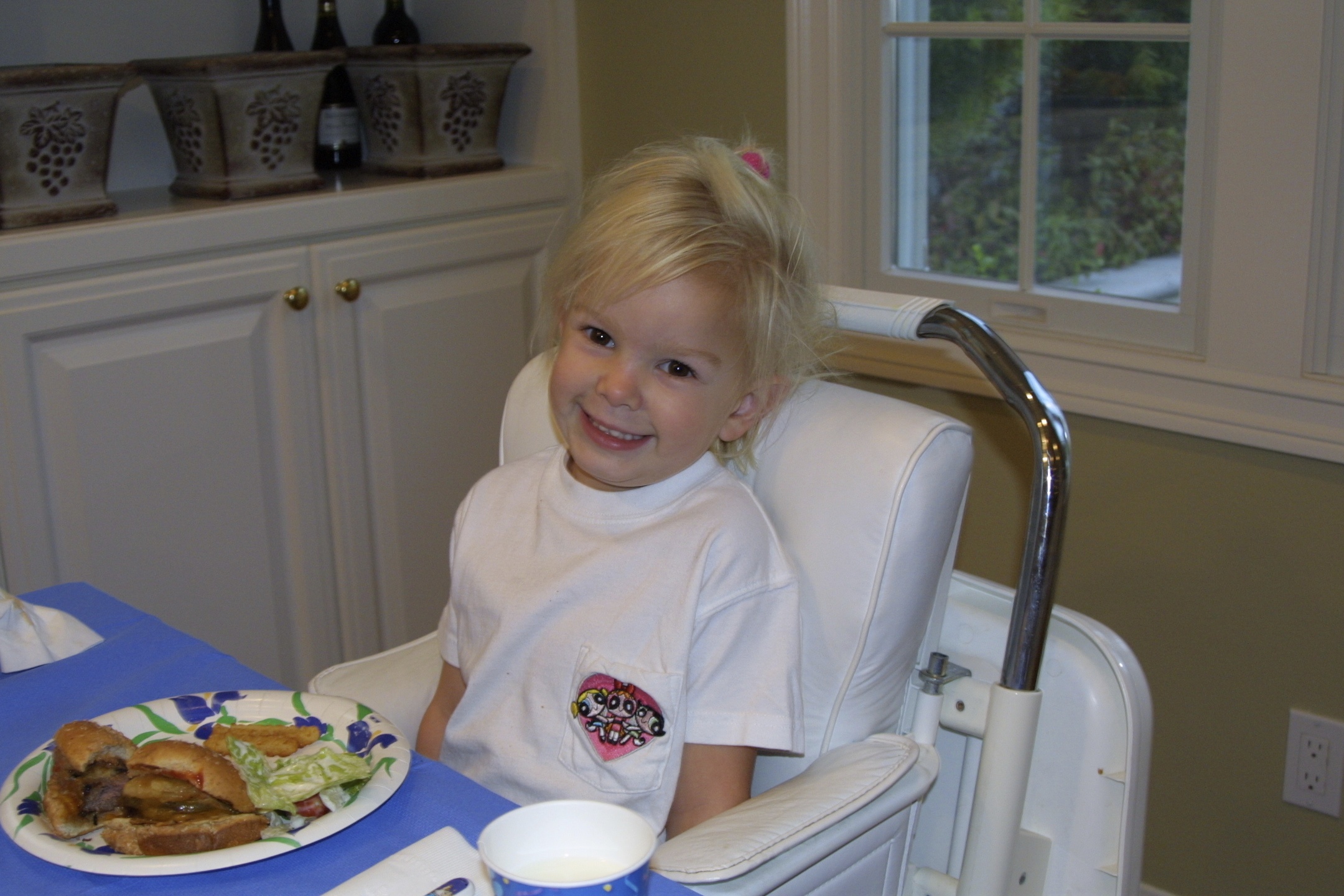
#2: Being a parent gives our life purpose.
It feels good to help others, and as parents we naturally love to serve our children. It gives us a boost to know they need us so much and we are so vital to their lives. While we may complain about having to drive our kids everywhere, feed them, help them find lost items, and get them to their appointments, our parenting tasks provide meaning and purpose to our lives. So there’s a natural ambivalence we may feel about our children not needing us so much. But it is, of course, a natural part of our children’s development to eventually separate from us and form their own identity. Still, it can be painful to let our kids grow. As parents we need to acknowledge that one reason our kids may not become as self-reliant as they could be is that we’re holding them back because being needed by them gives our lives purpose.
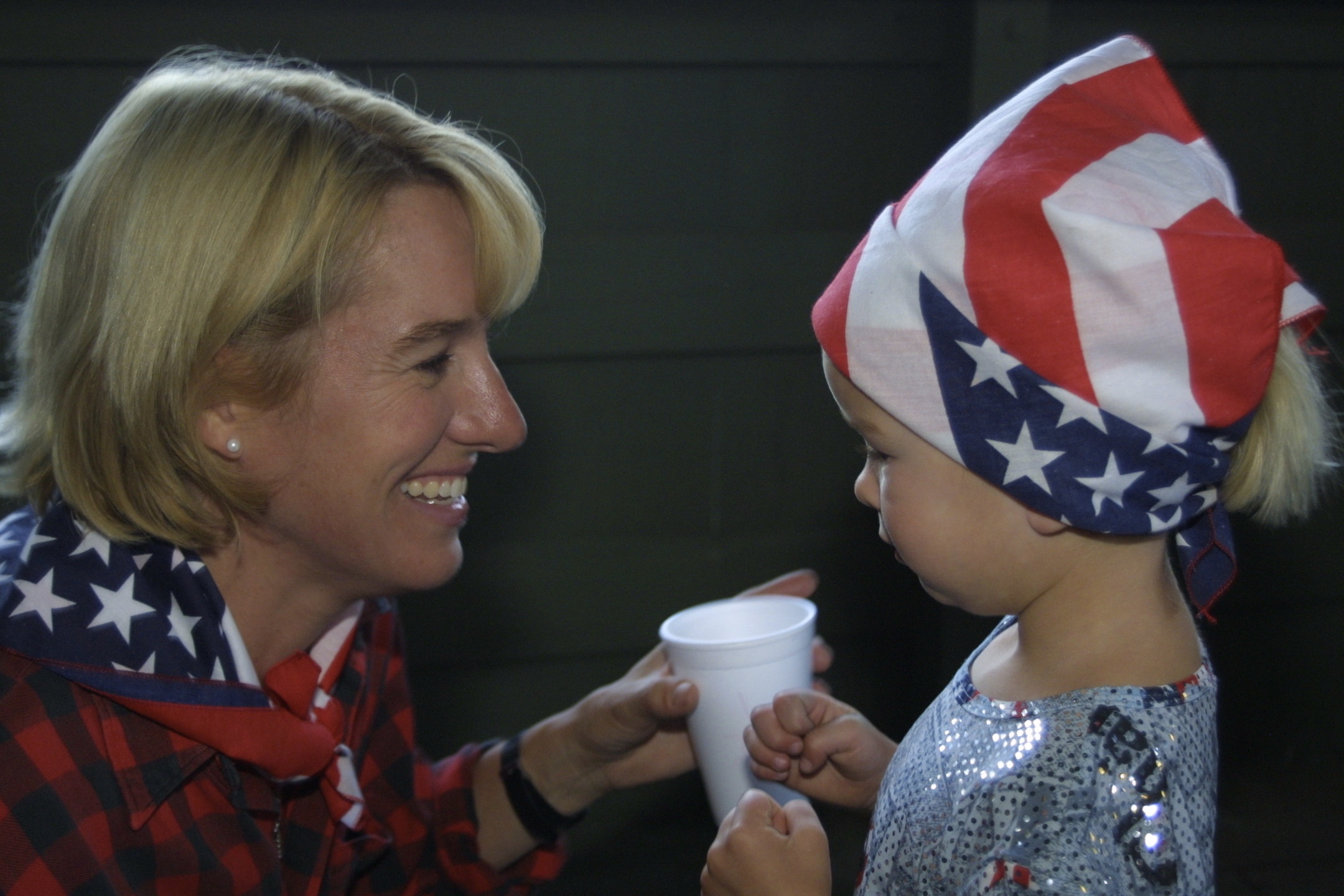
#3: It’s hard to change.
As parents, we get into routines and habits starting when our kids are very young and do need our help with everything. We continue doing certain tasks for them long past the time when they are able to start doing those things for themselves. Our kids, as they mature, grow in their capacity to take on more responsibilities, and it’s challenging to keep up with their development by allowing them to take on more responsibilities. It requires thought and reassessment.
I’ve often shared that for many well-meaning parents, one simple way we can improve our parenting is by doing less for our kids.
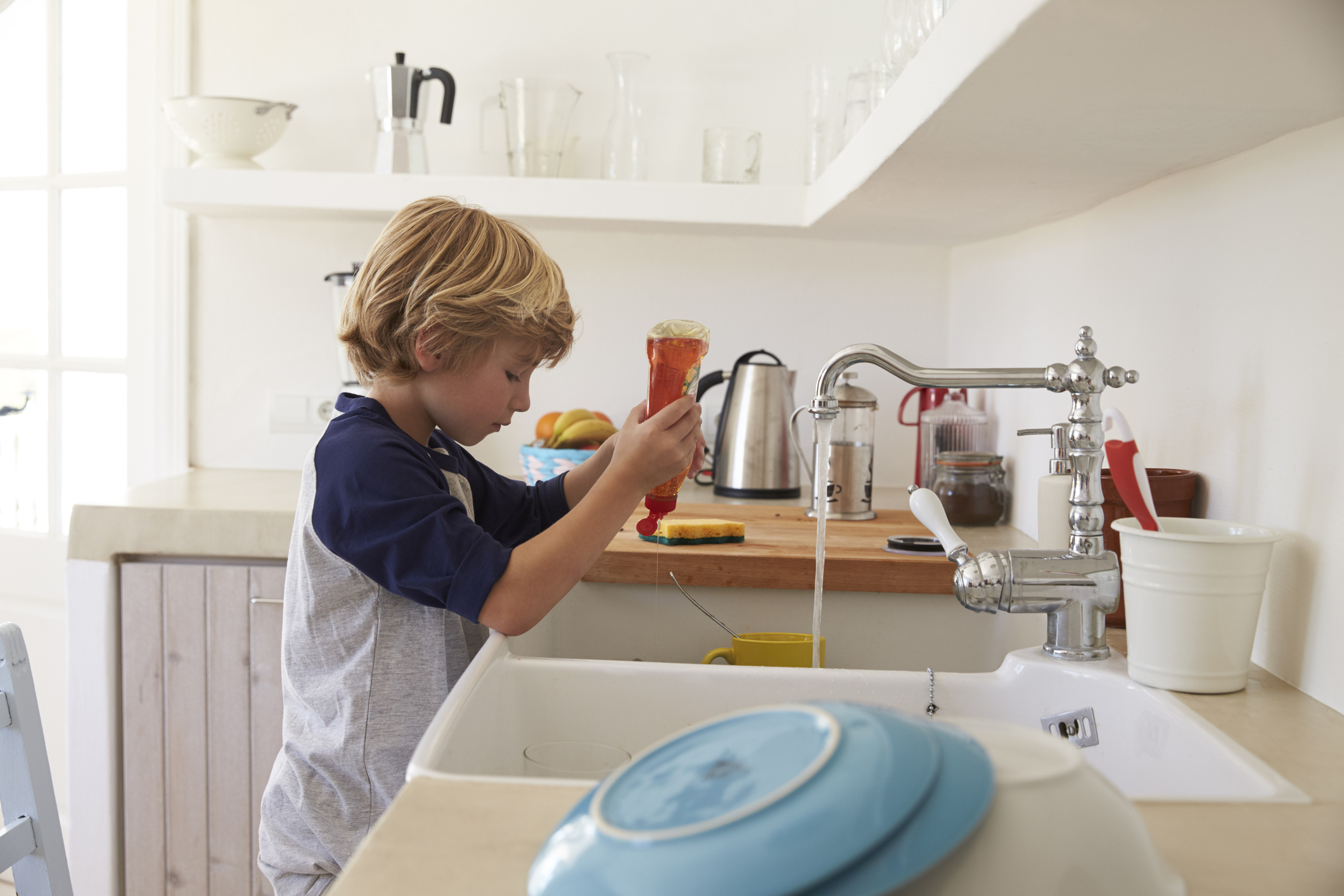
Boy squeezing washing up liquid into sink to wash dishes
#4: We tend to focus more on our kids’ weaknesses than on their strengths.
Kids are each on their own developmental trajectory. Many kids (1 in 5) have neurological differences that make their developmental path unique. Other kids have physical or mental differences that prevent them from being able to do some tasks on their own or at the same age as other kids. And everyone (kids and adults) have personality strengths and quirks. As parents, we are often fixated on what’s wrong with our kids instead of what’s right with them. By focusing more on their strengths and what they are capable of learning and doing, we help them grow into their best selves possible.
What are kids actually capable of?
Teachers, camp counselors, and others who work with kids have an advantage over parents, in that we get to spend a lot of time with lots of kids and we get to know what typical kids are capable of developmentally at different ages. It’s usually a lot more than what they’re parents think.
Look at it another way and think of your long game of parenting: At what age do you want your child able to take on full adult responsibilities? 18? 20? 25? 30? Regardless of what age you want your child to be a self-reliant adult, you will need to assist them in getting there by allowing them to practice many responsibilities well before the magical “adult” age. Because, as has been proven by both research and anecdotal experience, chronological age alone will not determine whether our child has become a capable, responsible, competent adult. It takes some effort on our part – and theirs – to get there.
Are you getting your child ready for adulthood? Print my Ready for Adulthood Checklist to review the skills kids need to become thriving adults!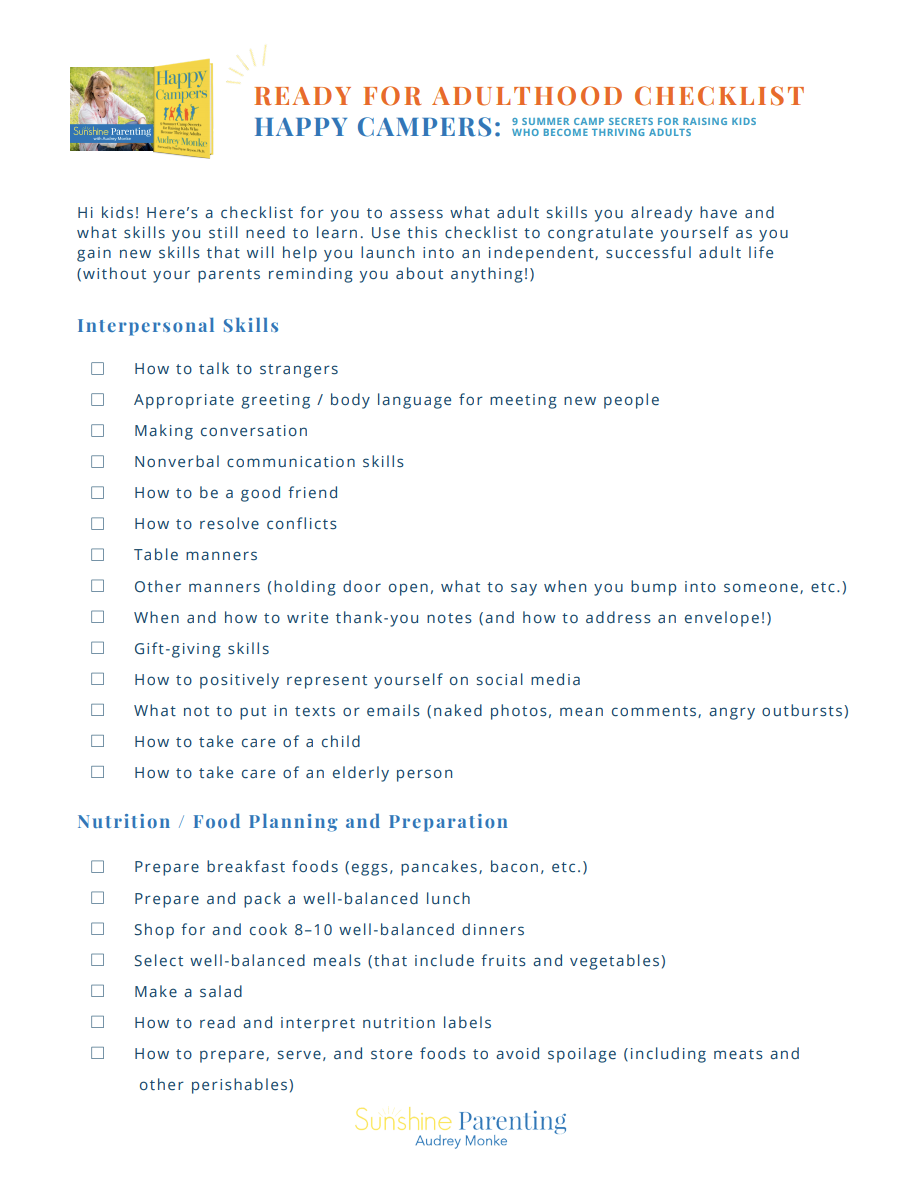
The list of skills and knowledge our kids need to acquire is daunting, but most of us managed to figure enough skills out eventually, and they can, too. So don’t worry! You can start slowly, allowing your child to take on ever more increasing responsibilities and independence as they get older. The earlier you get this strategy in place, the better. But even if your child is already a chronological adult, you can still apply this strategy.
A simple place to start is on or around your child’s birthday each year. Take a look at what they are already doing for themselves, for your family and household, and for the community. Assess what they can learn in the coming year. Having a conversation with your child about what they’d enjoy learning is a great place to start. Maybe they’ve been hankering to use the barbecue or paint a room. Use something they would like to do as a catalyst for learning a new skill. That’s a win-win! You now have someone who can help you with something you did yourself before, and they get the pride of developing competence at a new, useful task they can practice their whole life.
Think about adding a few new responsibilities and skills each year. My Household Task Audit checklist provides a simple way to help you assess what new household chores can be transferred from adults (aka you) to children. There are many more skills and tasks that kids can take on, so I’ve gathered some additional resources below.
Related Posts, Podcast Episodes, & Videos
Ep. 100: Teens Advice for Raising Responsible, Independent Kids
Sticky Note Solution: Chore Reminder
How doing LESS made me a BETTER Parent
Ep. 101: Entitlemania with Richard Watts
Household Task Audit: Having Kids Help More at Home
Resources
https://afineparent.com/building-character/teaching-kids-responsibility.html
https://centerforparentingeducation.org/library-of-articles/child-development/child-development-by-age/
https://www.inc.com/christina-desmarais/want-to-raise-kids-who-thrive-science-says-do-thes.html
